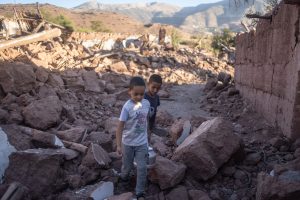
All four University of Mississippi students currently studying abroad in Morocco are safe and accounted for after a 6.8 magnitude earthquake struck the region last Friday, killing and injuring thousands.
According to Blair McElroy, senior international officer and director of study abroad, their safety was confirmed almost immediately.
“We have four UM students in Morocco right now studying in the Arabic Capstone Year program in Meknes, Morocco. All four are safe and accounted for,” she said.
Situated in northern Morocco, Meknes is the country’s sixth-largest city. It was not impacted by Friday’s deadly quake, though many in the city were both shaken and on high alert in anticipation of possible aftershocks.
“We have a robust emergency response and wonderful Arabic Flagship partners both on campus and off campus who reported their safety almost immediately,” McElroy said.
The epicenter of the earthquake was in the Al Haouz region, where it is estimated by the Moroccan government that 60% of the population was killed by the natural disaster. Current estimates place the earthquake’s death toll at just shy of 3,000. More than 5,000 have been injured, and many remain unaccounted for.
Currently, there is only one student from Morocco studying at the University of Mississippi. The Office of Global Engagement has reached out to them to offer support and assistance.
University of Mississippi students abroad receive pre-departure training on how to use their international insurance, including security assessments and emergency response. Students also subscribe to the Alert Traveler program, which sends them texts and emails when a crisis occurs abroad in addition to other resources.
“We have partners on the ground who report safety concerns and provide updates in an emergency. We also highly encourage U.S. citizens studying abroad to enroll in the Smart Traveler Enrollment Program provided by the U.S. Department of State, which provides guidance to citizens through the embassies abroad,” McElroy said.
North of the epicenter, the historic city and popular tourist destination of Marrakesh has seen significant damage. Madeleine Dotson, a senior political science, Arabic and public policy leadership major has visited and studied in Marrakesh several times over the past five years. She spent Saturday contacting her friends and former host families overseas.
“My initial reaction was shock and surprise. Earthquakes aren’t necessarily unheard of in Morocco, but quakes of that magnitude are once in a century. Once that shock faded, I immediately messaged friends and former host families across the country,” she said. “Luckily, my friends and host families in Rabat and Meknes were not impacted. Although, my family in Meknes said they spent hours of the night outside, just in case.”
One of these friends was Hassan Ait Hammou, an English teacher, social activist and higher education Ph.D. candidate at Ibn Tofail University in Kenitra City, Morocco. On Friday evening around 11:10 p.m., when the earthquake struck, he was visiting his family. Within seconds, he and his family went from thinking there were cats on the roof, to thinking they were the victims of a home invasion, to finally realizing that they were actually in the midst of a terrible earthquake.
“This happened within seconds — we then realized that we were in an earthquake. I screamed, ‘It’s an earthquake, go out, go out.’ I was with my mom, my dad, my wife and the mother-in-law of my sister. In the blink of an eye, things started trembling,” he said.
After helping his sister’s mother-in-law out of the house, all of Ait Hammou’s family members were outside, and all of them survived the earthquake. Of the 130 homes in his community, no one was hurt.
“The majority of people were still awake at that time,” he said. “If they were asleep, it would have been a catastrophe because after the quake, a lot of rooms and houses fell down.”
In the impact zone, most people’s homes are completely or at least partially damaged. Roads are blocked, and crucial infrastructure, like school buildings, is damaged and closed. In addition to infrastructure issues and a strain on resources, Ait Hammou described significant emotional challenges in the aftermath of the earthquake that will require advising and emotional counseling.
“The trauma, the experience that they’ve had — it’s the worst experience of their lives. We don’t live in Japan. We don’t live in a place where earthquakes are to be expected,” he said. “In Morocco, natural disasters are rare. Imagine someone experiencing a volcano eruption or a volcano for the first time. It’s always there. The tragic night is always there in their minds.”
For UM students, and citizens in general, Ait Hammou emphasized the importance of cross-cultural understanding and global solidarity.
“Even when we’re living far away from each other, we have to be compassionate. We have to be merciful. We have to be peaceful. We have to develop this culture of solidarity and the ability to feel the culture and sadness of others. Because at any time, any place, people may be affected. And together, we can help each other,” he said.
While there are currently no relief efforts being organized on UM’s campus, Dotson and McElroy encouraged students to donate to legitimate charitable organizations such as High Atlas Foundation, CARE Morocco and International Federation of the Red Cross and Morocco Red Crescent.


























